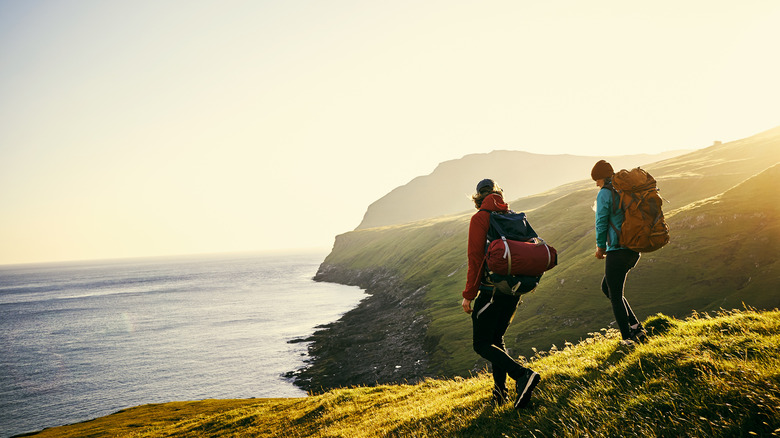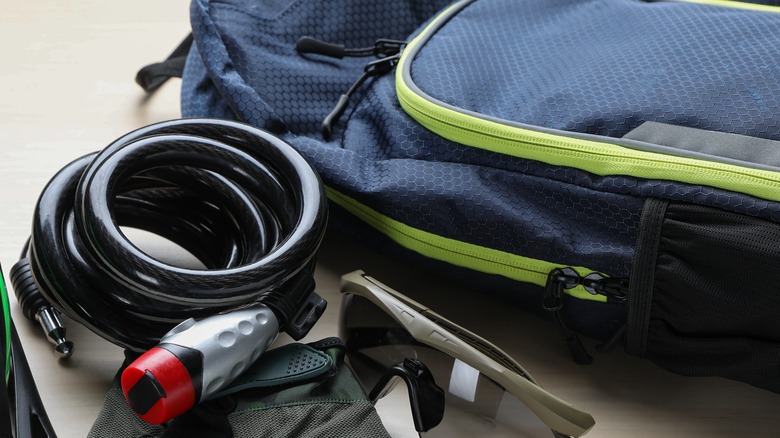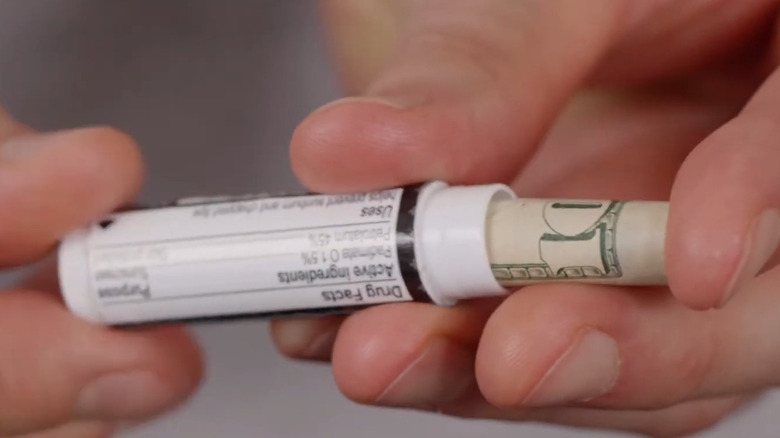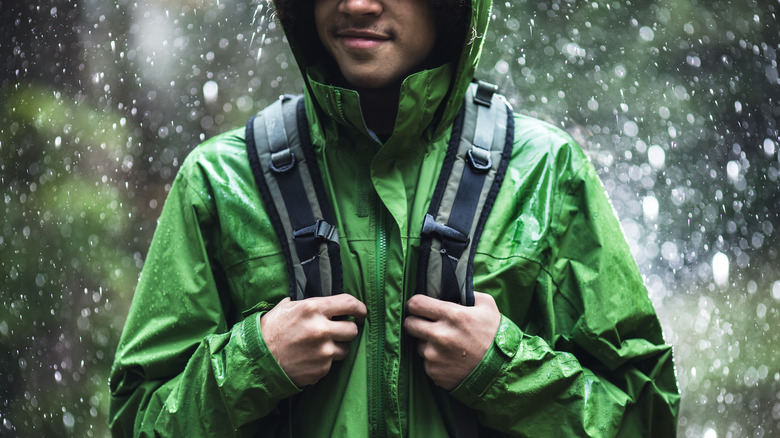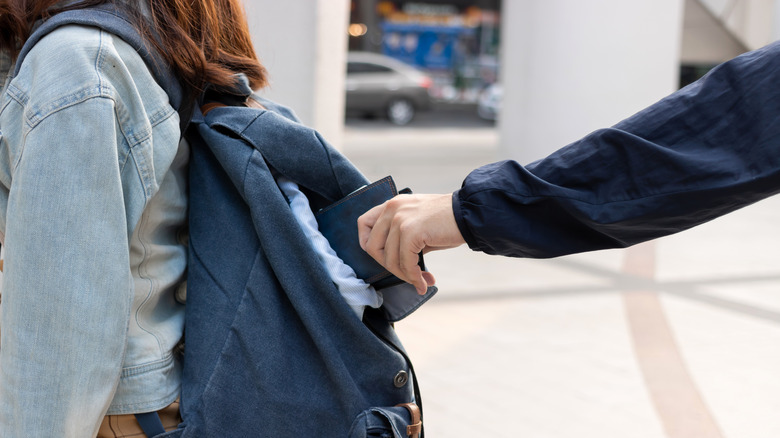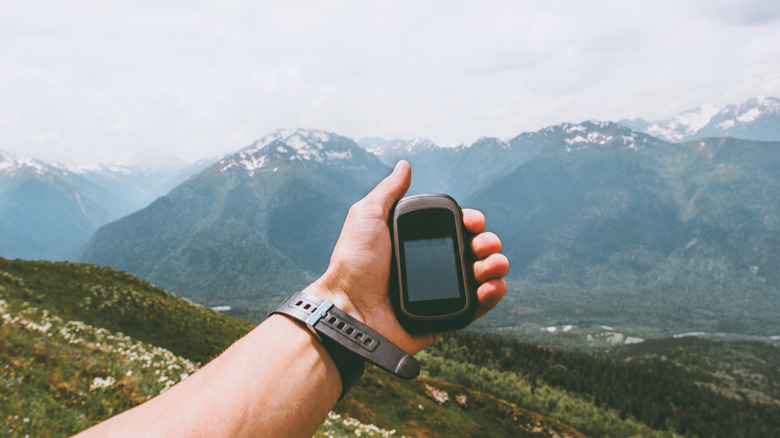Keep Your Belongings Safe While Backpacking With These Genius Tips
Backpacking is all about putting your things into a pack and heading out into the world to face new adventures head-on. Whether that means picking a destination close to home to go hiking by yourself or staying in Peruvian youth hostels on your way to a lakeside getaway in South America, everything you'll need for your trip has to go into your bag. You packed all the essentials, followed all the space-saving tips and tricks, and are ready to go. But what happens if your bag is damaged, lost, or stolen?
It's a great idea to memorize some phone numbers in case the worst happens: your phone is lost, and you need to contact a friend or family member to help you. You might even have to reach out to your country's embassy to return home from overseas. Fortunately, there are many steps you can take ahead of time to ensure that you and your belongings stay safe while you're backpacking so you can focus on the important part: having the trip of a lifetime.
Bring a cable lock
Always keeping your backpack on would be the best-case scenario, but unfortunately, you must sleep and bathe sometimes. Removing your backpack makes it much easier for a passerby to nab it without your notice. If you stay at a hostel with lockers available, definitely use them, but before you drop off your bag there or in your room, consider adding some extra protection. If you have a double-sided cable lock, you can attach your bag to something too big to be stolen, like a piece of furniture. A determined and prepared thief can cut through the cable to steal your backpack, but it'll deter anyone hoping to grab it and take off discreetly.
What if you have nothing to attach your bag to? If you travel in a group, consider locking your bags together when you take them off. You can use the same cable lock, thread it through your straps and zipper pulls so it can't be opened without cutting the cables, and lock them together. This doesn't prevent theft 100% of the time, but such a heavy, bulky bundle will be more challenging for a thief to abscond with than slinging an unattended backpack over their shoulder and running away.
Disguise your valuables
The best way to avoid having your belongings stolen by an opportunistic thief while backpacking is to ensure you don't become a target in the first place. Someone desperate may go for your bag of dirty laundry, but if you have a flashy watch around your wrist, the latest iPhone in your hand, and pop open your wallet to pay for a bottle of water and reveal a stack of cash, you're going to be a much more tempting mark. That doesn't mean you shouldn't bring anything worth stealing when you go backpacking, but you should do your best to keep these items discreet.
One clever strategy is to stash your valuables in an unassuming supermarket bag. If anyone catches a glimpse inside your backpack, they may assume you have snacks rather than a laptop. Some travelers take this strategy even further, placing their money in old wrappers, empty lipstick containers, and empty lip balm tubes so that they will be overlooked if anyone gets a chance to raid their bag. Just make sure you don't forget and throw out your travel cash!
Use dry bags
When backpacking, you can't always guarantee you'll be indoors when a sudden rainstorm hits. Even if your bag is theoretically waterproof, that can't protect you from failing to zip it completely or a leaky water bottle. The solution? Stash anything that shouldn't get wet, like electronics and your passport, in dry bags. Not only does this strategy protect your belongings from getting damaged, but it also prevents you from needing to leave all your stuff out to dry in the sun, which is the perfect opportunity for someone passing by to snatch something.
Fortunately, you don't have to break the bank on dry bags. Sure, you'll find large, high-end options and even backpacks that you might want to invest in before you brave rainy climates or cross any streams. However, there are also smaller varieties for your most important items that will only cost you around $5-20.
Carry two wallets
As frustrating as it is to pack anything you don't absolutely need in your already heavy backpack, it might be worth carrying a second wallet with you if you're going to be in an area where theft is a common problem for tourists. While it can be useful to split up where your cash is (the theory is that even if a thief gets some of your money, you won't be left stranded with no way to pay for anything), that's not the idea behind this technique. Instead, your second wallet is going to act as a decoy.
If you're particularly worried about being pickpocketed, you may want to keep a cheap wallet in an obvious spot, like the very top of your backpack or even your back pocket. This fake wallet can either be empty or, if you want to take things a step further, have $5 in cash and a couple of business cards inside. Hopefully, if a pickpocket snags this decoy wallet, they'll assume they already have your valuables and run off rather than go digging around in your bag for more.
Put a GPS tracker in your backpack
While there are many good techniques for keeping your belongings safe, things can always go wrong. They can get stolen, or they can be left on a bus by accident. If you suddenly find that your bag is missing, you can try backtracking and looking for it manually, but it'll be a lot easier to track your bag down if you thought to throw a tracker in the bottom of it before you left.
AirTags are probably the most popular portable luggage trackers, but as noted by one Reddit user on r/backpacking, they only work where there's service and other Apple devices to ping off of. If you will be backpacking through remote areas, get a GPS tracker that will work anywhere. These can be a little larger and heavier, but if you leave your backpack behind at a campsite by accident, it'll be worth it.
